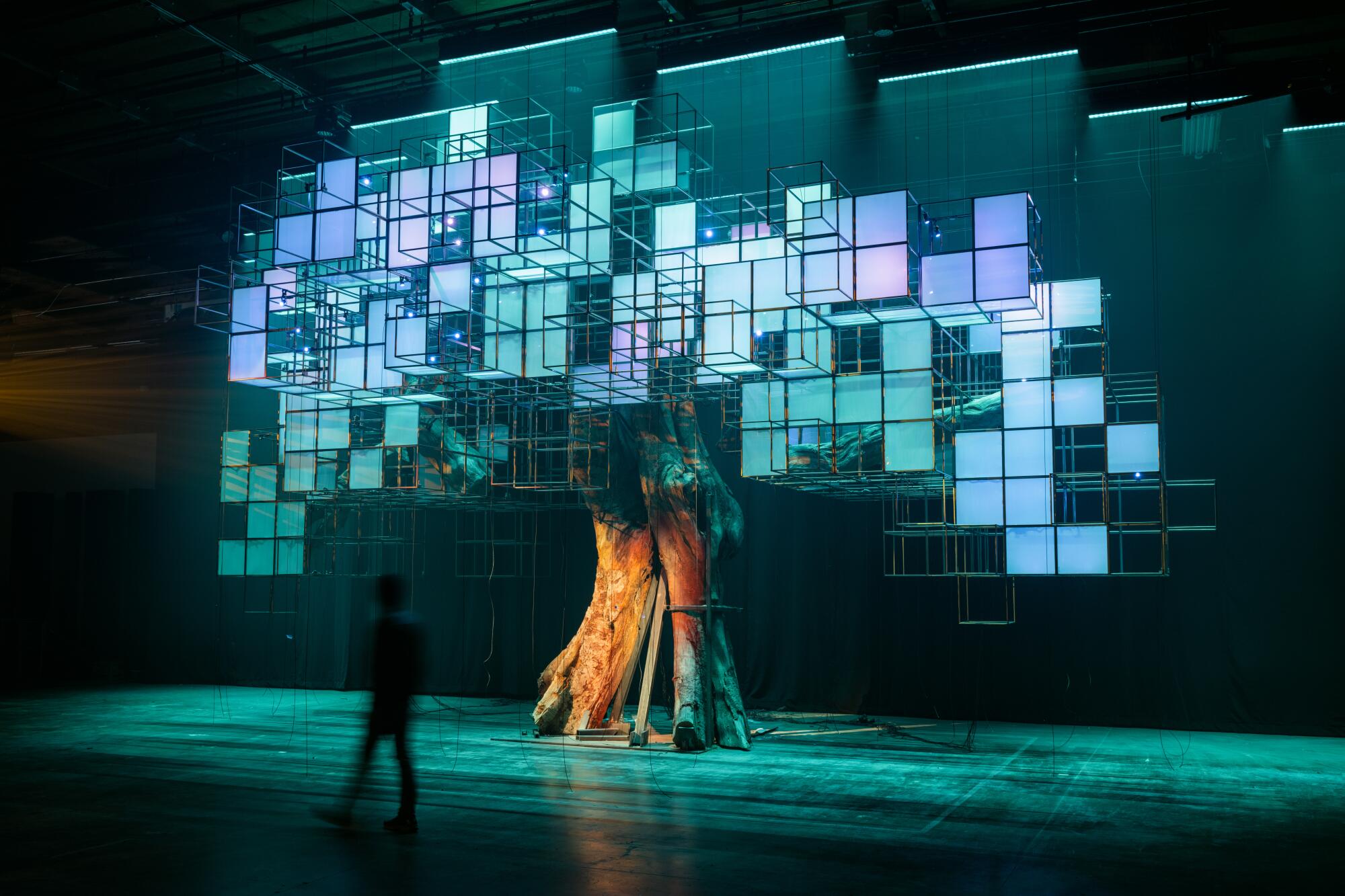
“Open your palm,” artist Glenn Kaino instructs me. “Think of the lines on your hand as the roots of a tree.”
We’re in a darkened warehouse, and Kaino’s silhouette is barely visible in the shadows. I oblige and suddenly a giant, spinning disc bearing concentric tree rings appears in the darkness. Its briskly whirling spiral forms a hypnotic tunnel. Thunder and lightning sound in the background.
“Stare into it,” Kaino urges, counting backward from 10. “Now look at your hand again.”
The lines on my palm are now swaying.
“It’s magic,” Kaino says, smiling. “Things that you thought were previously static aren’t. And it shows how everything is connected — people to objects, to nature, to each other.”
Then Kaino pivots and leads us into a mystical forest that’s thick with illusions and storytelling.
This wilderness is part of Kaino’s “A Forest for the Trees,” an immersive new show he created and directed inside a 28,000-square-foot Boyle Heights warehouse. The ticketed experience, which speaks to Indigenous practices around land stewardship, ecological interconnectedness and preservation of the environment, leads visitors on an hourlong journey through an actual forest with 87 redwood trees. Most are tree remnants ethically sourced from a Northern California forest and repositioned inside the space, while others are cast replicas. The forest also includes handmade sculptures, animatronic robots, original music and glimmering installations that alternately employ mirrors, light, water and shadows to create a range of visual trickery.
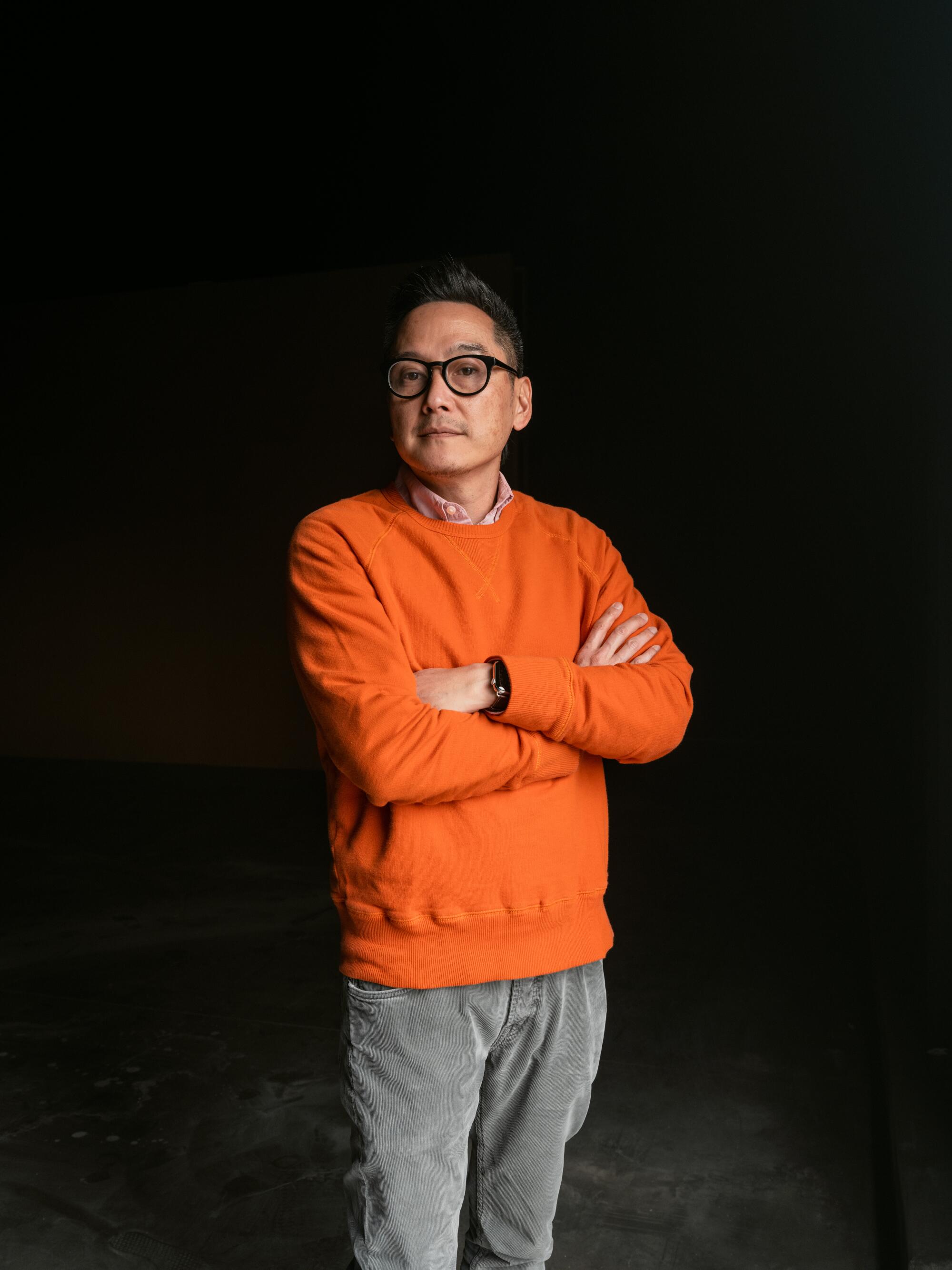
Kaino says it’s the most ambitious work he’s ever created. “I feel like I’ve worked my entire career to build the skills and the tools to even try to conceive of this idea, let alone to hopefully accomplish it with a level of quality.”
Climate justice and the art of collaboration have long been recurring themes in Kaino’s work, and he’s no stranger to large-scale, immersive art projects. He’s co-curating the Hammer Museum’s 2024 Pacific Standard Time exhibition, “Breath(e): Towards Climate and Social Justice,” and he worked with scientists at NASA’s Jet Propulsion Laboratory in 2020 to create the immersive installation “Tidepools,” which utilized frozen alcohol vapor and bioluminescent marine organisms.
“A Forest for the Trees” is no exception. Kaino’s show partners are the experiential art company Superblue, which has staged events in New York, Miami and London, and a business development arm of the Atlantic magazine, Atlantic Ventures. (The show is inspired by the magazine’s editorial series “Who Owns America’s Wilderness?”) About a dozen artistic collaborators helped bring the show to life. Actor-activist Jesse Williams narrates one story. TV on the Radio’s David Sitek created the music and many of the sculptures on view with Kaino under the banner of their new art and music partnership, High Seas.
The history of controlled burns practiced by Northern California’s Karuk Tribe, to protect the land, are central to the exhibition. Bill Tripp, director of the Department of Natural Resources for the Karuk Tribe, was a consultant. Laundi Keepseagle, from the Standing Rock Sioux Reservation, located in North and South Dakota, served as a key producer on the project.
With so many collaborators, Kaino’s forest is a forest of creative voices, he says. The project highlights his skill as a solo maker but also as “a maker of partnerships, a maker of community. The metaphor of us all being connected like trees is not something that’s insignificant for me.”
Kaino walks deeper into the forest on a wooden footpath that, when visitors arrive, will be coated with dark, recycled rubber mulch. The trees form dense forest walls on either side of him. A steady, soulful drumbeat flows in the background. Many of the trees feature robot faces and their bulbous eyes blink as they chat with passersby.
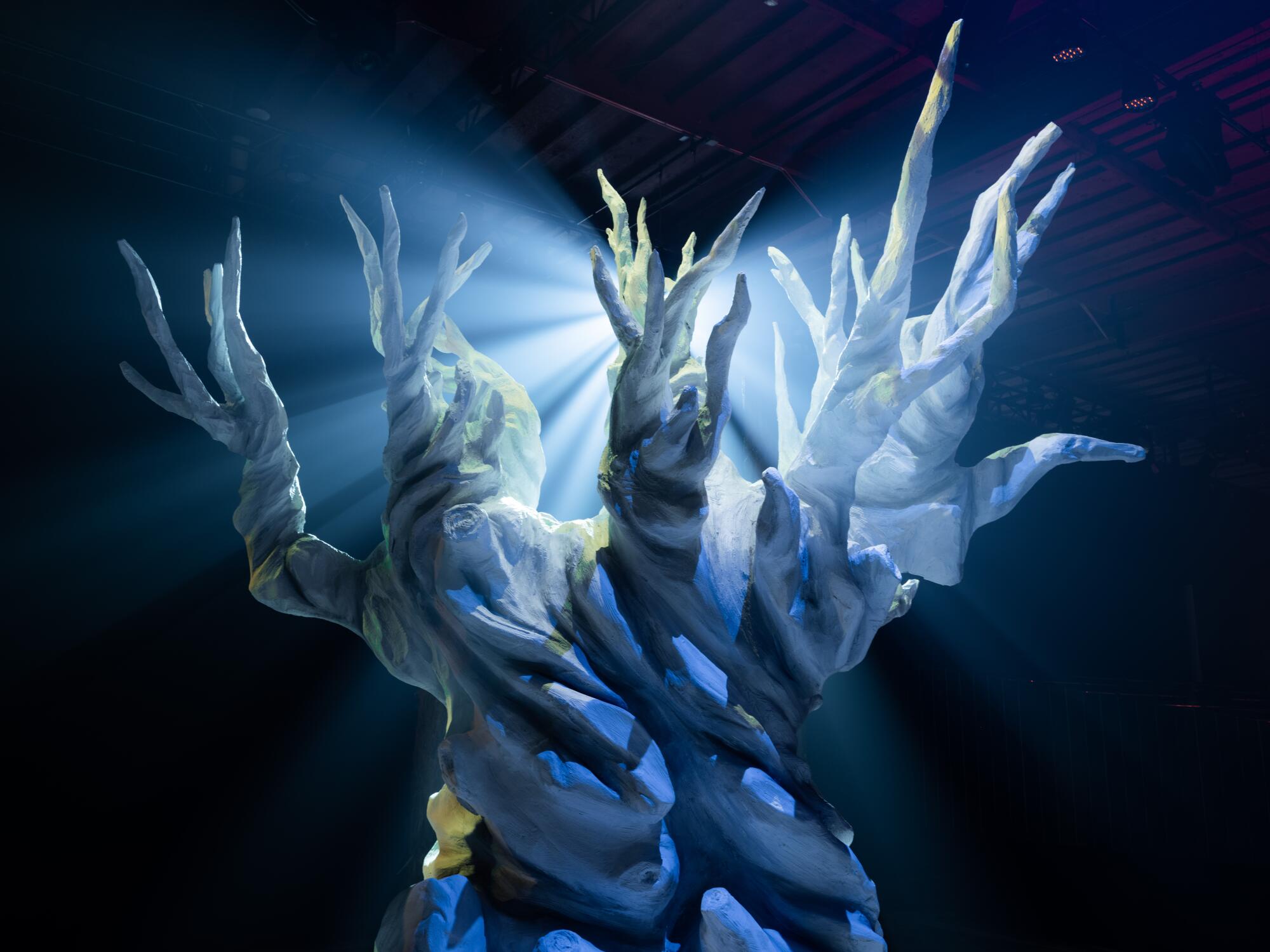
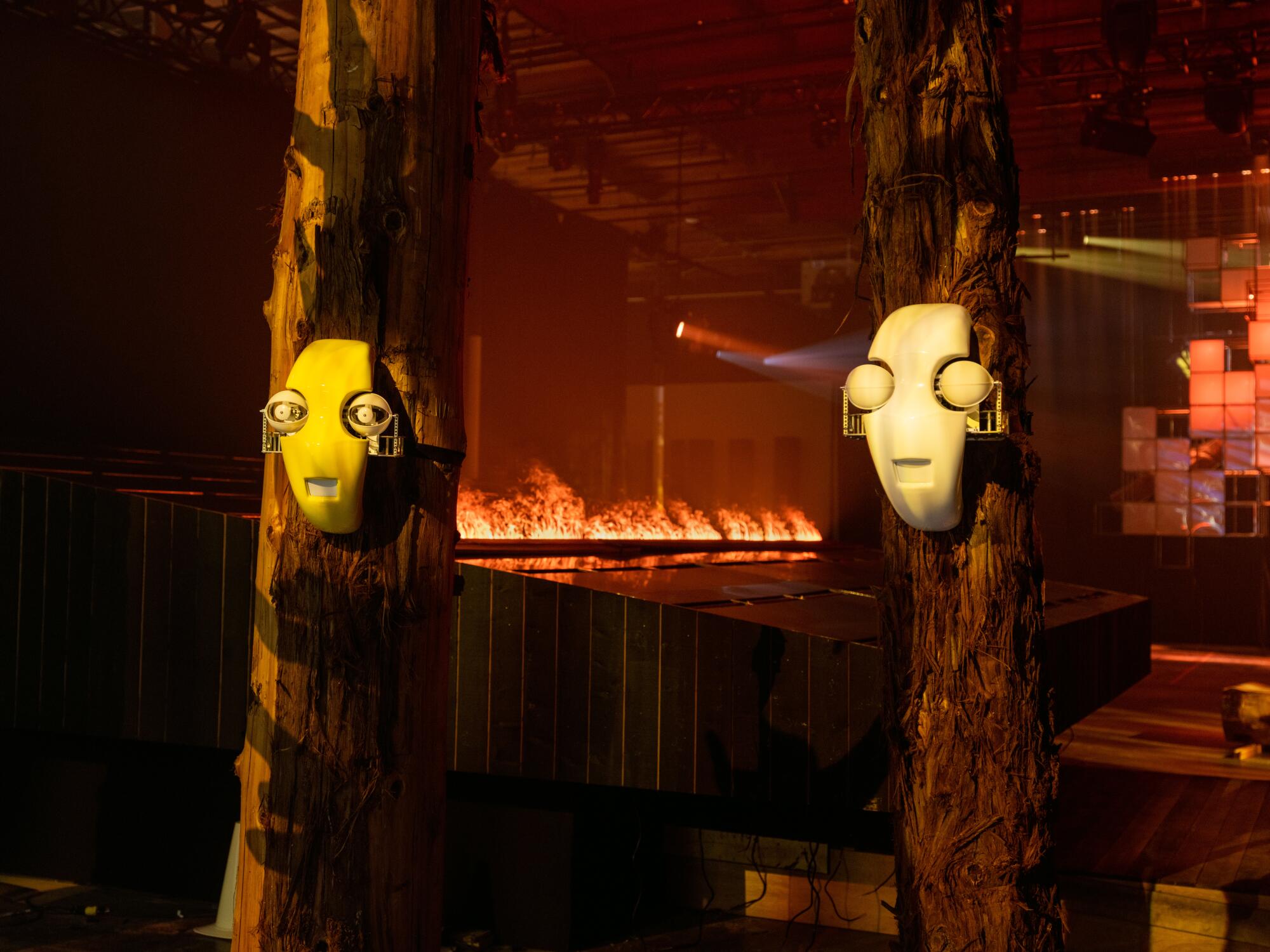
“If you love something, set it tree,” one says.
“Don’t get all sappy on me!” says another.
“The idea is that humans are so human-centric,” Kaino says, “that we need to put eyes on something in order to believe it, to listen to it.”
Around the bend there’s a clearing with a shimmering water well installation bathed in blue light. Looking down through the transparent floor, which visitors can walk over, it appears to plummet infinitely. Mournful, rhythmic chanting — Priscilla Ahn performing with High Seas — fills the space, as if the singer-songwriter is crooning from the bottom of the well.
In the distance, rising flames crest what looks to be a steep mountainside. The illusions of fire emit water vapor that looks like tufts of smoke.
“A Forest for the Trees” is, at its core, as much about story — a celebration of story — as the ideas in the show themselves. Stories are presented in myriad forms, told through recorded narration but also sculpture, music, live performance, illusions, even knock-knock jokes.
A free-standing sculpture by the entrance to the show, for example, features a thicket of standing microphones that look like burned trees. It’s inspired by the 2020 Slater fire. They’ve been rewired to play audiences’ stories about their own relationships to trees. The crowd-sourced narratives will grow with the show and will be archived on an app that’s still in development.
The first room of the exhibition, or act of the show, steeps visitors in an immersive story-in-the-round that illustrates an interconnected forest ecology. As Williams speaks of a thousands-year-old Karuk Tribe ceremony, Ukrainian artist Kirill Yeretsky’s illustrations, which resemble the hand-rendered pages of a graphic novel, appear around the room. The richly colored wildlife scenes glow inside lightboxes mounted on tree-like sculptural forms. One by one they encircle the room, ultimately enveloping the audience.
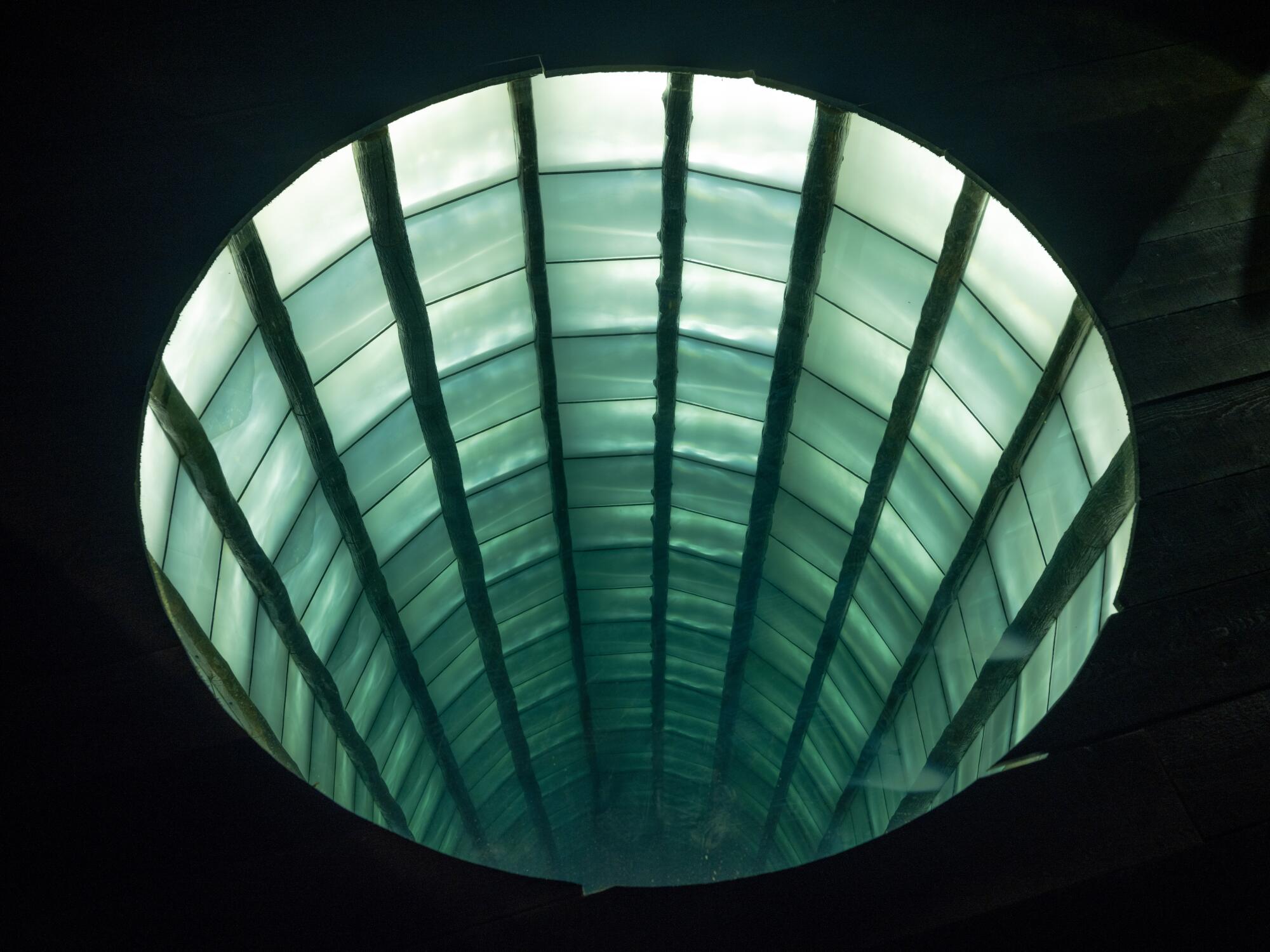
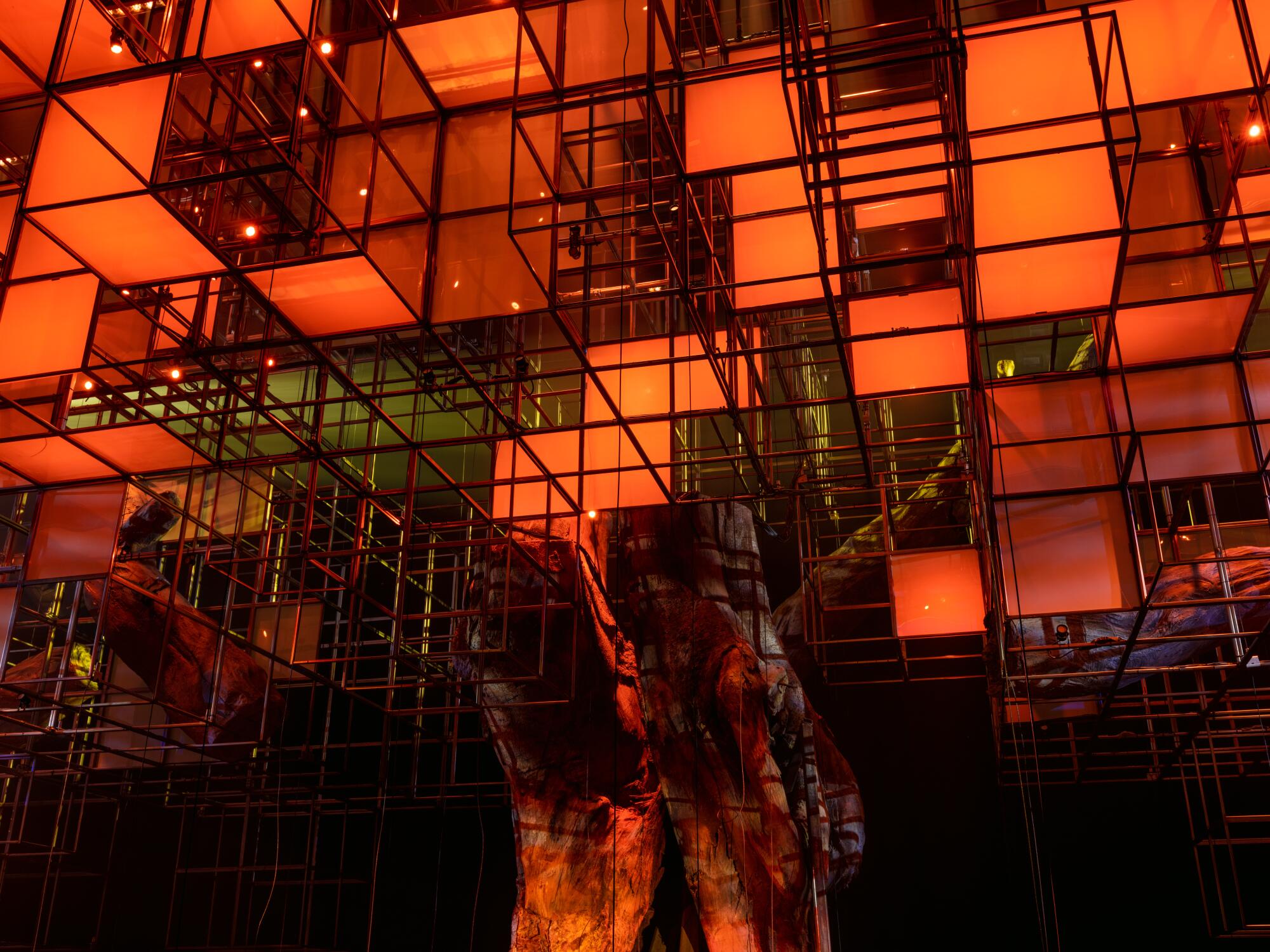
“You are about to enter a symbolic forest,” Williams narrates, “within which we can invent real systems of justice for our planet.”
As visitors journey through the forest, Kaino’s own narration about the making of the show can be heard, intermittently, on more than 50 speakers embedded in the floors, suspended from the ceiling and mounted on trees, like whispers in the wind or rustling tree leaves.
One tree in the forest is a 14-foot-tall sculpture of a real, more than 4,800-year-old bristlecone pine, which lives in an undisclosed location in central California — one of the oldest known trees in the world.
“When I first heard about this tree I was like, ‘Oh my gosh, it was a sapling before the pyramids were created,’” Kaino says. “It’s seen the rise of colonialism. What could this tree tell us if it could tell us what it saw?”
Further along is another historic tree, one with local roots. It’s a pixelated-looking replica of the 144-year-old Moreton Bay fig tree that overlooked El Pueblo de Los Angeles downtown before it collapsed in 2019. Kaino and his team, while looking for wood to build out the show, found the real fig tree trunk at Angel City Lumber, which makes objects from reclaimed lumber.
The resulting artwork, the final piece in the show, looks like an image from a video game. It features the real fig tree trunk, craggy and stout, anchoring a tangle of steel cubes filling out the branches and leaves.
Suddenly the music kicks up, a song performed by Kittie Harloe with High Seas. It’s at once sorrowful, calm and hopeful. Multicolored lights pulse and glitch throughout the tree leaves, turning it from clear to white to lilac to deep blue.
“This is our attempt to symbolically resurrect the Olvera Street fig less than a mile and a half from where it was,” Kaino says. “How do we create both the ancient and future together? The oldest tree in L.A. combined with ‘Minecraft’ thinking, symbolic of new technology.”
“A Forest for the Trees,” Kaino adds, is meant to be optimistic, as much about the future as the past. For every ticket sold, a new tree will be planted through the nonprofit Conservation International.
“It’s about reimagining our relationship to nature and the planet,” Kaino says. “I hope people walk away with a small bit of understanding that there are truths that exist — ancient practices that we should start embracing and reinvigorating — and we need to figure out how to work, together, with nature.”
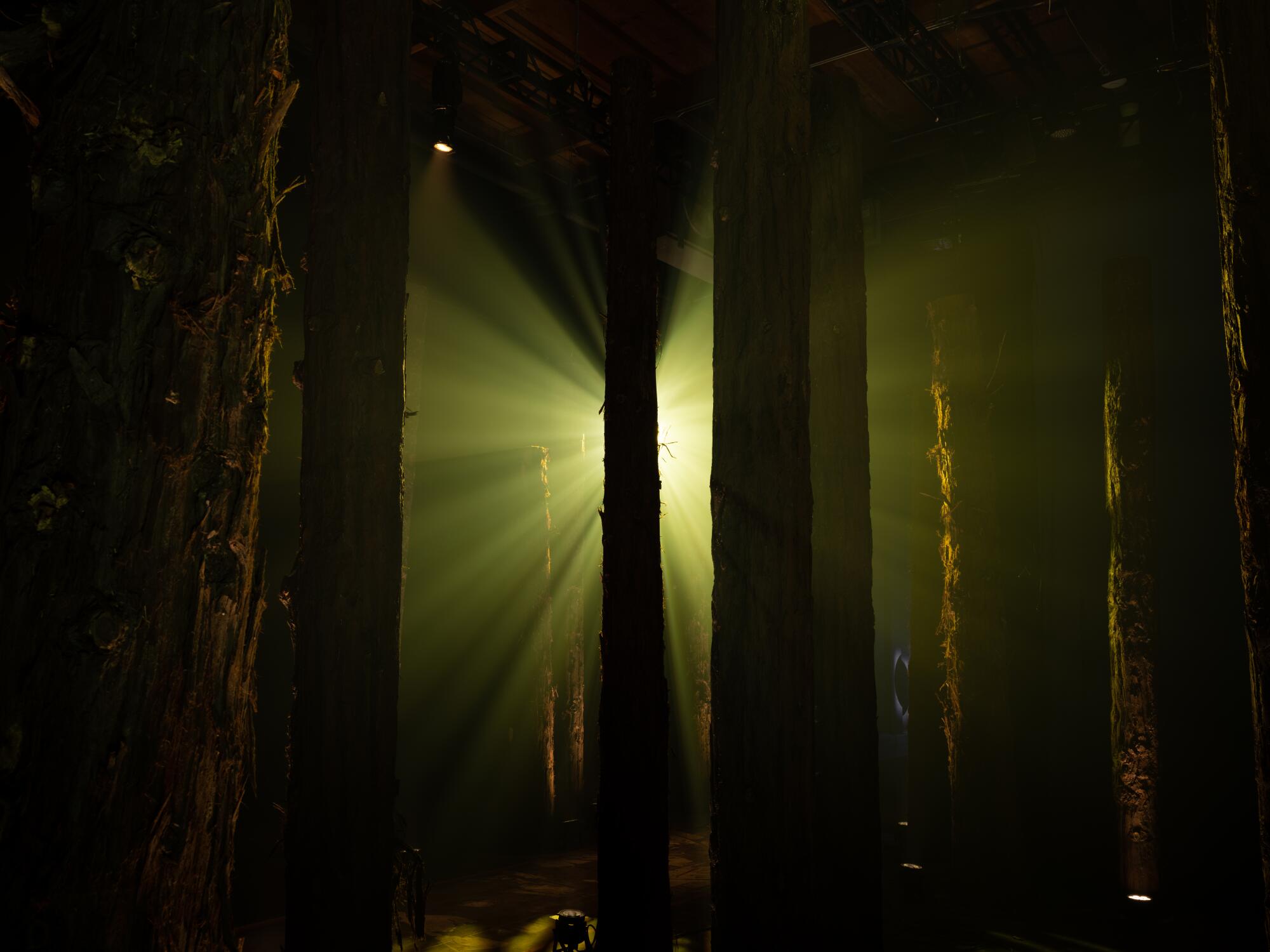
‘A Forest for the Trees’
Where: Ace Mission Studios, 516 South Mission Road, L.A.
When: Wednesdays through Sundays, May 13 through summer 2022. See website for varying times.
Tickets: $10-$50. See website for ticketing options.
Info: aforestla.com